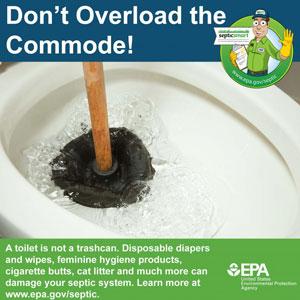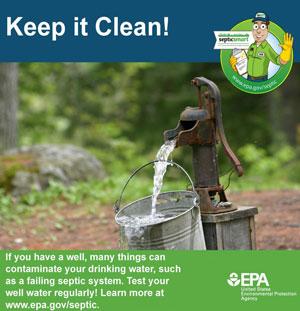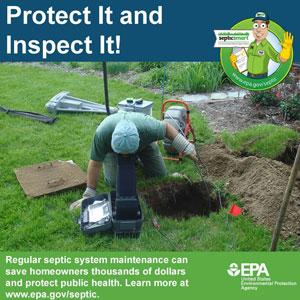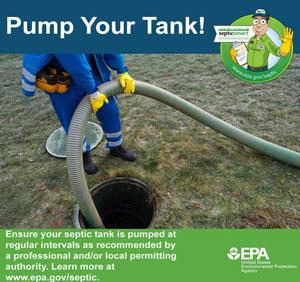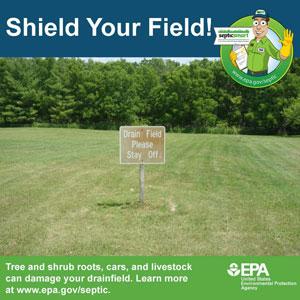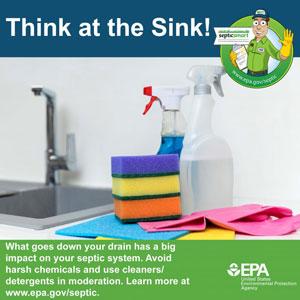SepticSmart Homeowners
Maintaining Your Septic System...
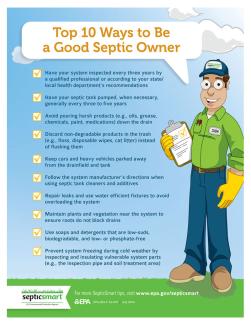
Saves you money
Regular inspection and maintenance fees of $250 to $500 every three to five years is a bargain compared to the cost of repairing or replacing a malfunctioning system. Keep in mind that the frequency of inspections and pumping will vary based on system type, how many people live in the home, and the system size.
Protects your property value
An unusable septic system or one in disrepair will lower your property value, and potentially can pose a costly legal liability.
Keeps you and your neighbors healthy
Household wastewater contains disease causing bacteria and viruses and high levels of nitrogen and phosphorus. If a septic system is well-maintained and working properly, it will remove most of these pollutants. Insufficiently treated sewage from septic systems can cause groundwater contamination, which can spread disease in humans and animals. Improperly treated sewage poses the risk of contaminating nearby surface waters threatening swimmers with various infectious diseases, from eye and ear infections to acute gastrointestinal illness and hepatitis.
Protects the environment
More than four billion gallons of wastewater are dispersed below the ground’s surface every day. Ground water contaminated by poorly or untreated household wastewater poses dangers to drinking water and to the environment. Malfunctioning septic systems release bacteria, viruses, and chemicals toxic to local waterways. When these pollutants are released into the ground, they eventually enter streams, rivers, lakes, and more, harming local ecosystems by killing native plants, fish, and shellfish. Learn more about how septic systems can help support greener, more sustainable communities.
SepticSmart Quick Tip Videos
The SepticSmart Week Quick Tip videos are designed to educate the homeowner on the importance of properly using and maintaining their septic system, such as how a septic system works, what not to put down the drain, the importance of getting your well water tested, and more.
Think at the Sink!
Learn what not to put down your kitchen sink (such as fats, oils, or greases), how to properly dispose of food waste, and how to use cleaning supplies in moderation.
Don't Strain Your Drain!
Learn about the importance of using water efficiently, staggering water use of water based appliances, and using energy efficient appliances.
Keep It Clean!
Learn about the importance of testing your well water, and its relationship to your septic system.
Shield Your Field!
Learn about your septic system’s drainfield, including how it works, and tips to take care of it.
Don't Overload the Commode!
Learn about what can be flushed down the toilet, and what should be thrown in the trash.
Additional Resources
- Rules Establishing Minimum Standards Relating to Location, Design, Construction and Maintenance of Onsite Wastewater Treatment Systems (OWTS) 250-RICR-150-10-6
- NEW! OWTS Construction Starts/Inspections Notification Form
- Soil Evaluations
- USDA NRCS Web Soil Survey
- UCDAVIS NRCS Soil Web
- Permit Tolling Statute
- Critical Resource Area Boundary Tool
- Groundwater Table Adjustment Factors
- Vendor's Tank Specifications Check List
- USGS Water Table Information
- OWTS Repair Guidance in Critical Erosion Areas
- Field Guide for OWTS Installations
- Added OWTS Treatment Requirements for Jamestown Shores and Warren-Touisset Point and Highlands Neighborhoods
- Design Requirements for OWTS Repairs: Island Park and Portsmouth Park Neighborhoods, Portsmouth
- Stormwater Guidance for Single Family Lots
- Understanding Business Preapplication Requirements for Drinking Water and Wastewater Treatment Systems
- RIDOH/RIDEM Business Preapplication Form
- Additional Regulations
- Applications & Forms
Onsite wastewater treatment systems can provide many years of service if they are properly maintained and regularly inspected. For more information on how to care for your system, see the fact sheets below.
- URI Septic System Fact Sheets
- EPA SepticSmart Homeowners
- Septic System Checkup
- Water Softener Backwash BMPs
- OWTS Application for Repair
- Financial Assistance for Septic System Repairs
- Summary of RI Municipal Onsite Wastewater Programs
- Home Improvement- Application for Alteration to a Structure
- Home Improvement- Residential OWTS Suitability Determination
- Added OWTS Treatment Requirements for Jamestown Shores and Warren-Touisset Point and Highlands Neighborhoods
- Design Requirements for OWTS Repairs: Island Park and Portsmouth Park Neighborhoods, Portsmouth
- Obtaining a Permit for a New Home's Septic System
- Wet Season Groundwater Table Monitoring
- Guidance for Septic System and Private Well Owners Before and After Hurricanes and Major Flooding Events
- RV, Boat, and Mobile Homeowner Tips

